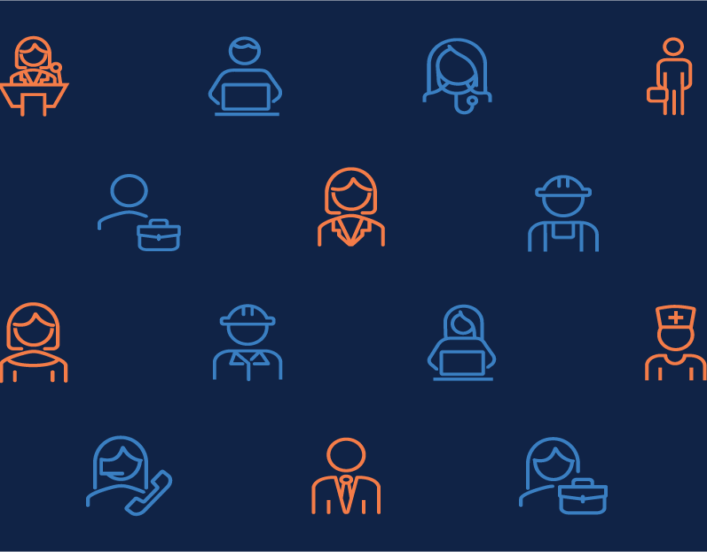DEI Toolkit: Income & Socioeconomic Status

Definitions
Definition of income
1: a gain or recurrent benefit usually measured in money that derives from capital or labor.
Source: Merriam-Webster Dictionary
Definition of socioeconomic
1 : of, relating to, or involving a combination of social and economic factors.
Source: Merriam-Webster Dictionary
Income is fundamentally the money we receive for the work we do, or, in its purest form, what we get paid. However, income is much more than that. It is often what determines the neighborhood we live in, the types of schools we have access to, what healthcare options we have. Our income shapes our interactions with the criminal justice system and determines what life in retirement will look like. It is clearly more than just the money we receive for the work we do.
A related concept is socioeconomic status, which is defined by sociologists as the social standing of an individual that has three key components: income, occupation and education. A person’s socioeconomic status is tied to a number of quality of life considerations and opportunities to get ahead. It also includes the ability to access power and important services related to health, stability and housing.
The dominant ideology in the U.S. holds that is it is possible to change your socioeconomic status over your lifetime, but research has shown that it is highly unlikely. This is largely due to discrimination related to race and gender, which negatively impact socioeconomic status and keep segments of the population in their current position.
Here’s why: We know that women and people of color face discrimination in their education and the in the workplace. This hinders their ability to advance, achieve leadership positions, and attain equitable pay. So if that’s the case, how can we expect them to simultaneously be able to advance their socioeconomic status? Of course, there are examples of people who have been able to advance despite the obstacles they have faced. But those are generally the exception and not the rule.
So what can we do as an organization? Well, we’re doing it through our work on workplace and economic equity, but we must keep pushing. When women get equal pay, their families and all of society thrive.
Readings:
- Print Materials:
- Altschuler, Glenn. 2015. ‘Class ceiling’ in workplace suppresses the American dream. The conversation
- Ardoin, Sonja. 2018. College aspirations and access in working-class, rural communities: The mixed signals, challenges, and new language first-generation students encounter. Lexington Books
- Ardoin, Sonja, Becky Martinez, and Jamie Washington. 2019. Straddling class in the academy: 26 stories of students, administrators, and faculty from poor and working-class backgrounds and their compelling lessons for higher education policy and practice. Stylus Publishing.
- Arruzza, Cinzia, Tithi Bhattacharya, and Nancy Fraser. 2019. Feminism for the 99%: a manifesto. Verso.
- Ardoin, Sonja. 2018. College aspirations and access in working-class, rural communities: The mixed signals, challenges, and new language first-generation students encounter. Lexington Books
- Bird, Robert & Newport, Frank. 2017. What Determines How Americans Perceive Their Social Class? Gallup
- Cottom, Tressie McMillan. 2018. Lower ed: the troubling rise of for-profit colleges in the new economy.
- Friedman, Sam, and Daniel Laurison. 2019. The class ceiling: why it pays to be privileged.
- Foster, Gwendolyn Audrey. 2005. Class-passing: social mobility in film and popular culture.
- Gaskell, Adi. 2019. Forbes. Why Class Diversity Matters At Work.
- Gray, Barbara, and Jennifer J. Kish-Gephart. “ENCOUNTERING SOCIAL CLASS DIFFERENCES AT WORK: HOW “CLASS WORK” PERPETUATES INEQUALITY.” The Academy of Management Review 38, no. 4 (2013): 670-99. Accessed September 27, 2020.
- JACK, ANTHONY ABRAHAM. 2020. PRIVILEGED POOR: how elite colleges are failing disadvantaged students. HARVARD UNIV Press.
- Kendall, Mikki. 2020. Hood Feminism. [S.I.]: Penguin Random House Audio Publishing Group.
- Williams, Joan C., Multhaup, Maria, & Mihaylo, Sky. 2018. Why Companies Should Add Class to Their Diversity Discussions. Harvard Business Review.
- American Psychological Association. Fact Sheet: Education and Socioeconomic Status
- American Psychological Association. Fact Sheet: Ethnic and Racial Minorities & Socioeconomic Status
- Report of the APA Task Force on Socioeconomic Status
- The University of Tennessee. Inclusion: Awareness of Socioeconomic Diversity
- Books
- 99 Must Reads on Income Inequality
- Websites:
- eXtension Foundation Impact Collaborative. DEI Issue Type: Socioeconomic Status
- Social Class and Rankism at Work
- ClassMatters.org
- ACC Library Services Research Guides: Equity, Diversity, and Inclusion: Socioeconomic Status
- US Income Distribution Over Time
- 6 Facts About Income Inequality
- Everything You Need to Know About Income Inequality
- Trends in US Income and Wealth Inequality
- Wealth Inequality in the US
Activities:
- How the Deck is Stacked: Income Inequality
- Wealth Inequality Game
- The Ten Chairs
- Using Monopoly to Teach Social Stratification
Videos:
Related
Dimensions of Diversity & Identity

Key Terms & Concepts

DEI Toolkit: Occupation

